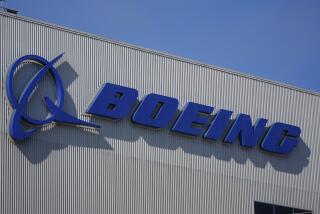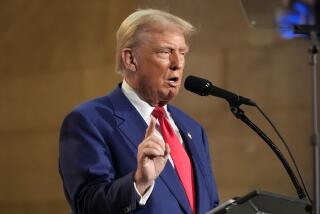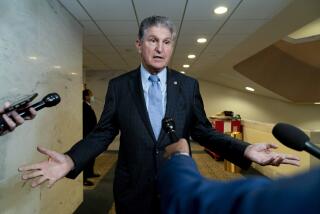Execs would give up tax breaks for lower corporate rate
- Share via
Reporting from Washington — Executives from four large U.S. companies told lawmakers that they would give up lucrative tax breaks in exchange for significantly lowering the 35% corporate rate, spurring efforts to overhaul the tax code.
Executives from Boeing Co., Sears Holding Management Corp., Emerson Electric Co. and Perrigo Co., a leading pharmaceutical manufacturer, said Thursday that they prefer the simplicity and certainty of a rate as low as 25% over the complexity of calculating frequently shifting tax breaks.
One such break, the tax credit for research and development expenses, has been modified frequently by Congress and sometimes has been allowed to lapse temporarily.
“We would be willing to take a rate reduction and in return give up the R&D credit, given the way its presently structured,” James Zrust, vice president of tax for Boeing, told the House Ways and Means Committee.
The company spent more than $4 billion on research last year. Boeing did not respond to a request about how much it claimed in research and development tax credits. Getting corporations to agree to give up tax breaks they use — as opposed to ones they don’t — is a key to advancing plans being drafted in Washington to reduce the corporate tax rate.
In a rare sign of agreement, the Obama administration and congressional Republicans want to cut the rate to help U.S. companies compete with countries with much lower corporate tax rates.
But to prevent such a move from adding to the huge U.S. budget deficit, both sides want to offset the cost by eliminating a host of tax deductions, credits and loopholes that allow many companies to pay a much lower effective tax rate.
Corporate tax breaks, such as credits for manufacturing in the U.S. and write-offs for equipment purchases, will total about $124 billion this year, according to the Senate Budget Committee.
By taking advantage of those breaks, Boeing, General Electric Co. and 10 other large U.S. corporations were able to avoid paying any taxes on a combined $171 billion in pre-tax U.S. profits from 2008 to 2010, Citizens for Tax Justice said in a report this week.
The companies received a total of $2.5 billion in tax refunds, for a combined effective tax rate of negative 1.5%, the report said.
Zrust defended Boeing, saying tax advantages for developing the company’s new 787 Dreamliner and a more fuel-efficient version of its 747 jumbo jet will expire and that the company will begin paying more taxes as those planes are rolled out.
But recent reports that major companies have avoided paying taxes highlight the unintended consequences of some tax breaks, said Walter J. Galvin, vice board chairman for Emerson Electric.
“It’s a very unfortunate situation,” said Galvin, whose company reported an effective tax rate of 36% on U.S. profits last year. “It just points out that corporate tax reform and simplification is needed.”
But overhauling the code by eliminating tax breaks will be difficult because companies find them so lucrative, said Mark Stutman, head of the tax practice at accounting firm Grant Thornton.
A recent survey by the firm of 318 top financial officials at U.S. companies found that more than 60% wanted to keep their existing tax breaks unless the corporate tax rate was reduced to at least 25%. But 17% said they preferred to keep their tax breaks no matter how much the rate was cut.
Rep. Charles Rangel (D-N.Y.) said that companies facing a big financial hit would make it difficult to overhaul the corporate code.
“Somebody’s got to pay to make this revenue-neutral,” he said. “Somebody getting unfair tax breaks is going to lose them.”
Neither the White House nor congressional Republicans have said which tax breaks they want to eliminate. And while House Republicans want to reduce the corporate tax rate to 25%, Treasury Secretary Timothy F. Geithner has said the administration would like a rate in the “high 20s.”
Some liberals have advocated using savings from eliminating tax breaks and loopholes to reduce the deficit instead of lowering the corporate rate. But Ways and Means Committee Chairman Dave Camp (R-Mich.) said he opposed that.
“Tax reform cannot and should not be confused with increasing taxes. It must be done in a revenue-neutral manner,” he said.
At Thursday’s hearing, the corporate executives said the 35% corporate tax rate made it difficult to compete with foreign companies. The combined U.S. federal and local corporate tax rate this year — at 39.2% — was second only to Japan’s 39.5% among the 34 industrialized nations in the Organization for Economic Cooperation and Development.
But including all U.S. tax breaks, the average effective rate for large companies was 27.7% from 2006 through 2009, according to a recent study by PricewaterhouseCoopers for Business Roundtable. That rate still was the fourth highest among Organization for Economic Cooperation and Development nations.
“We do not need the world’s lowest rate to compete, but our increasingly disparate rate is putting us at a disadvantage,” said Judy L. Brown, Perrigo’s chief financial officer.
But Rep. Jim McDermott (D-Wash.) questioned whether reducing the corporate tax rate would create jobs or just more profits.
“If we lower the tax rate to 25%, will you stop laying off people in the United States?” he asked Galvin, whose company reported eliminating about 20,000 jobs in 2009.
Galvin said that if the economy grows, the company would grow. And a fairer tax code, he said, would make U.S. companies more competitive with those in other nations that have been reducing their rates to lure business.
“We need to wake up and join them if we want the U.S. to stay competitive,” he said.
More to Read
Inside the business of entertainment
The Wide Shot brings you news, analysis and insights on everything from streaming wars to production — and what it all means for the future.
You may occasionally receive promotional content from the Los Angeles Times.











